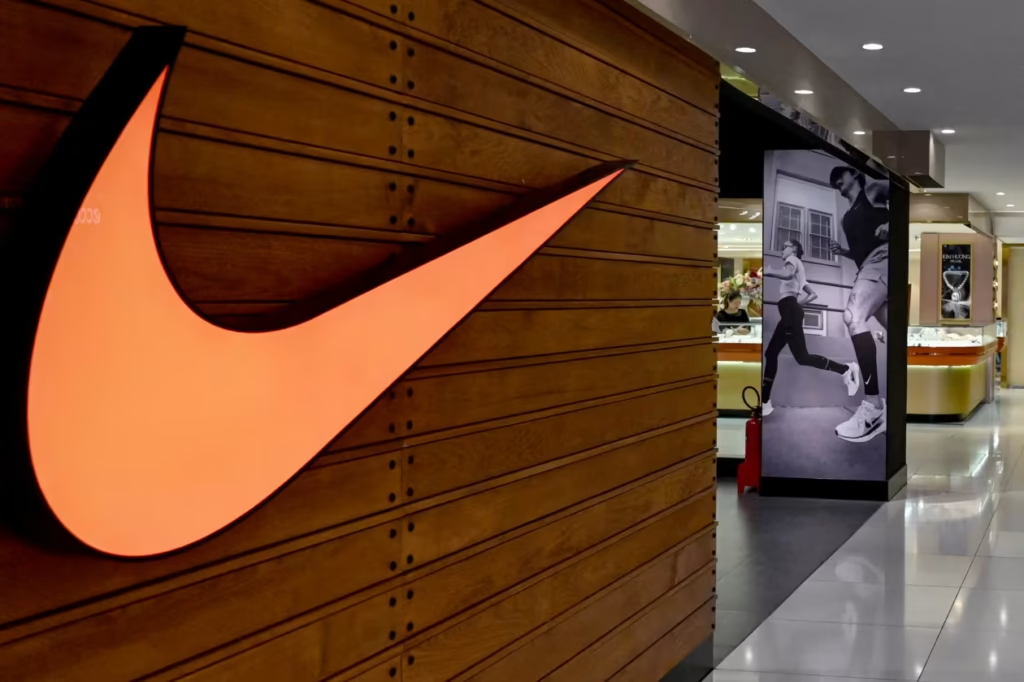The Nike logo is featured at a retail mall in Hanoi, Vietnam.
Although Nike Inc. has many worries about competitiveness and tariffs, one analyst suggested on Wednesday that the company may be making progress on both issues.
According to a research note released on Wednesday by TD Cowen analyst John Kernan, consumer interest in Nike (NKE) and its Jordan brand has increased slightly, while consumer interest in other brands that have reduced sales for the company over the last three years, such as Adidas (XE:ADS) (ADDYY), Saucony (WWW), Skechers (SKX), Asics (JP:7936) (ASCCY), and New Balance, has decreased.
Additionally, Kernan pointed out that risk was “contained” following the repeal of the so-called de minimis exception, which permitted goods under $800 to enter the country duty-free. He listed Nike’s attempts to clear its backlog of unwanted shoes, recent management changes, and decreased discounting at Foot Locker (DKS) stores as advantages. Additionally, he claimed that Wall Street analysts “underappreciated” the company’s margin rebound.
“Our preference-share data suggests, in our view, that share is stabilizing under [Nike Chief Executive Elliott] Hill, and even showing signs of increasing sequentially for Nike brand, as Jordan brand is undergoing the most marketplace cleanup,” Kernan stated.
Nike’s profits, he claimed, were at a “trough,” and the company could eventually make over $4 per share with $6 billion in free cash flow. Kernan said that he expects Nike to return to sales growth in its fiscal fourth quarter, when considering out foreign exchange.
As a result, TD Cowen upgraded Nike’s stock from hold to buy. Even though shares are down 2.2% so far this year, they were up 0.6% on Wednesday.
Following a few years of declining consumer demand as a result of cost-of-living rises, Nike’s shares saw a boost in June as investors deemed its first-quarter outlook more positive. In a note that month, Randal Konik, an analyst at Jefferies, said that the “bottom is in,” and he advised, “Just buy it.”
In addition to redoubling its focus on athletes and transforming its e-commerce channels into a destination for high-end, more expensive gear, Nike has been attempting to get rid of its excess of unwanted Dunks and Air Force 1 sneakers after oversupplying the market with those more casual sneakers. The brand, which has made a lot of its shoes in Asian factories, has also stated that it intends to rely less on China for production once U.S. tariffs take effect.
As for the de minimis exemption, which promoted international e-commerce, Kernan noted that Nike – unlike companies like as Lululemon Athletica Inc. (LULU) – was likely not using Mexico or Canada to ship to the U.S.
“Our conversations across the supply chain and public information lead us to believe Nike is not shipping into the U.S. from Mexico or Canada despite having [distribution-center] infrastructure to potentially do so,” Kernan stated.
In addition, Kernan said that since Hill took over as CEO in October, there have been seven internal promotions and four “rejoins” at the company at the top level. Prior to his comeback, Hill had over thirty years of experience at Nike.
“The team moves that Mr. Hill enacted represent a wide array of roles being addressed but all cumulatively reflect the goal of accelerating innovation, execution and growth,” Kernan stated.





